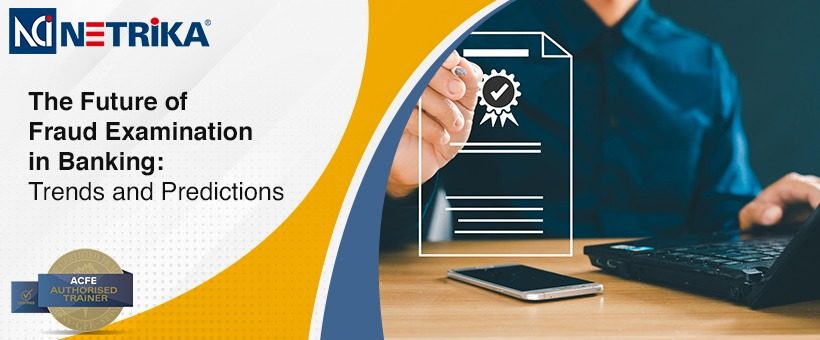News & Events
The Future of Fraud Examination in Banking: Trends and Predictions
- June 12, 2024
- Posted by: marketing@netrika.com
- Category: Blogs

Future of Fraud Examination in Banking
As long as the banking sector continues to adopt the technologically driven and evolving digital innovation, the threat landscape will also continue to mushroom and make systems vulnerable to sophisticated threats. Banks in such situations need to take a proactive, multifaceted strategy for fraud detection and prevention to stay ahead of the curve in this area. Read more.
To successfully manage these evolving risks, banks can leverage future trends, predictions, and best practices in financial fraud and maintain the integrity and confidence of the financial ecosystem by investing in cutting-edge technologies, cultivating a security-aware culture, and working alongside industry partners adept at detecting and mitigating such threats.
Trends and Predictions of Fraud Examination in Banking
- Integrating Artificial Intelligence, Machine Learning, and Human Expertise: With frauds in the banking sector becoming more cutting-edge and difficult to catch through traditional methods, the future will witness a strong and close integration of AI, ML, and human expertise. Where AI and ML can handle large-scale data as well as identify patterns from past information, human expertise can interpret these complex cases to make strategic decisions.
- Risk-Based Fraud Detection & Prevention Approach: The banking sector needs a risk-based approach that focuses on highly vulnerable areas and enables targeted measures to reduce the overall risk landscape from crippling the finances and reputation of banks.
- Advanced-Data Encryption: From quantum encryption to end-to-end encryption, the banking sector needs advanced strategies to protect its sensitive data from fraudsters. Both encryption make it difficult for fraudsters to breach systems by encrypting the entire journey of the banking process.
- Personalized Fraud Prevention Strategies: As technology evolves to a more sophisticated structure, the need for personalized fraud prevention strategies that leverage cutting-edge tools and best practices will continue to be one of the most robust trends. This will help banks identify customer behavior and design risk profiles based on data collected to further improve fraud examination measures.
- Enhanced Collaboration: Transparency in information sharing on emerging threats is crucial for banks to create a robust fraud detection and prevention framework. This collaboration will include public-private sector partnership, facilitating information sharing, and proactive methods in combating fraudulent incidents.
To better leverage the emerging trends and predictions in the banking sector for robust fraud examination, a certified fraud examiner helps to detect, prevent, and/or identify bank fraud. A CFE analyzes financial data, checks internal controls, interviews witnesses and obtains statements, compiling and evaluating evidence, writing reports, testifying in court, to assist banks in a robust fraud examination process.

